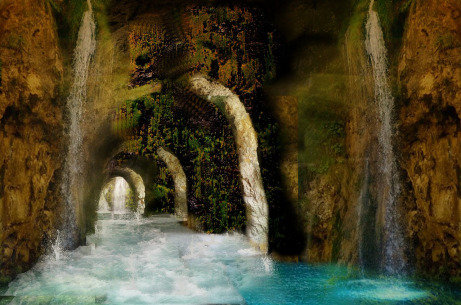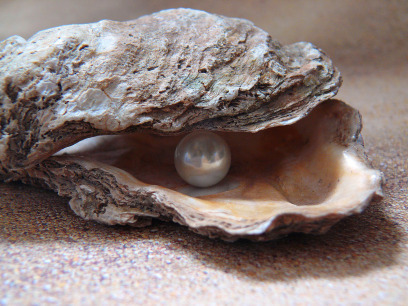Keren Dibbens-Wyatt's Blog, page 34
August 2, 2016
Veil of Tears 108: Wrestling

“So Jacob was left alone, and a man wrestled with him till daybreak.” Genesis 32:24 NIV
Wrestling was quite popular in the UK when I was small. Giant Haystacks and Big Daddy were what passed as celebrities back then, which really just meant they got to open supermarkets and appear on Tiswas. They seemed like gentle, wobbly giants to me, and whilst partly staged, the matches were not at all like the colourful over-the-top theatre that we now see in the WWF so popular in the States.
Wrestling with ourselves and with God often seems less dramatic than you might imagine as well. It can feel dark and lonely, those long nights where you are not sure if you are in a half Nelson with yourself or your maker. Where you are so tired, so worn out by the fight, that your aching spiritual muscles don’t know if they can take the stretched pain any more. And at the end, when day finally breaks, you may be left unsure if you have encountered God or not, unsure what his parting words may mean, and finding yourself with a lifelong limp for your troubles.
But to be sure, every genuine and determined seeker after the heart of God will experience such troubles. We will wrestle with our conscience, with our desires, with our ideas about who God is, and perhaps most of all with our egos.
And whilst we sit and lick our wounds, or nurse our confusion, or feel the dull ache in our thigh, we may find we too have come out of the other side of the night with a new name, a reconciliation on the horizon, and a new identity as an overcomer. Interestingly, it is our ability to overcome which is also the reason we are given new names by Jesus in Revelation.
Might our new names be fit for celebrity wrestlers, I wonder? But the ring in which we continue at times to struggle has no cameras, no bunting or fans, no glitter-spangled leotards (thank God), no energy for chutzpah. Instead it is endurance, sticking it out, holding on in the dark, keeping the faith, hoping against hope for our blessings when life has bodyslammed all the wind out of us, these are the ways to real victory, though the fight takes its toll and the dawn light may at first seem cold.
©Keren Dibbens-Wyatt
Photo from Pixabay


August 1, 2016
Veil of Tears 107: In the Dark

“So the king gave the order, and they brought Daniel and threw him into the lions’ den. The king said to Daniel, “May your God, whom you serve continually, rescue you!” Daniel 6:16 NIV
At the time of writing, my heart is heavy because of several swords of Damocles that are hanging over myself and my loved ones. They are things that will decide our futures, where we live and how we live. If the sword falls one way, we might find freedom, another, and we’ll be trapped or hurt. Things aren’t exactly going to plan. My plan that is. And I think of Daniel, about to be thrown into the lions’ den, and though of course his peril was far greater than ours, I wonder if he thought along similar lines. “This wasn’t really how I imagined it would be, Lord, to follow you, to pray so fervently for your people, and care about their well-being, and end up preparing to be torn limb from limb.”
“Is this really your plan?!” We cry in out in our hearts. “Is this seriously the best you could come up with?”
And we think and feel like that because we can’t see what God can see. Because it does look back to front and topsy-turvy, and it really does hurt. And waiting for lions to devour us is pretty scary. But, suppose God is even greater than we imagine, and the lions are going to have their mouths shut by an angel he sends? And then our faith will be even stronger, and our blessings more obvious to count, and our gratitude deeper and set on wiser foundations.
So no, I can’t see in the dark whether there is an angel standing guard or not. I don’t know if those mouths are shut tight or bearing glistening sharp teeth at me, jowls slathering at the thought of tearing the flesh from my bones. No more do I know why the Lord keeps us in the dark so many times in our lives. But I do know that I can trust him, whatever happens. I do know that even when Nebuchadnezzar’s guards roll that stone across the mouth of the den, with me on the wrong side of it, that my God is the one who knows how to rescue me, and that he has a history of setting his hapless beloveds free, of calling them out of caves, of shutting the mouths of lions and opening the mouths of tombs.
©Keren Dibbens-Wyatt
Photo from Pixabay


July 29, 2016
Landscape of Love 92: Dual Carriageway

You going to A and I to B, and each in a rush to be at the other’s leaving. Do we storm like juggernauts over the road, juddering the macadam crust? Or like snails, softly gliding over shell, brushing against mollusc flesh, one of us raising our shell politely whilst the other tiptoes its tyres upside-down along the risky underneath? Do we trouble to see the world upside down for the sake of another’s easy passage, or only deal with the surface? Is what stands beside us a blur, whirring past, gone before it’s noticed, faster than the speed of retina? Or do we make sure to smell the blooms and cock our heads to the buzzing within them, catching glimpses of glory and blue-tailed flies?
Text and photo © Keren Dibbens-Wyatt 2016


July 27, 2016
Veil of Tears 106: Scorched
Hi all! I took a couple of days’ break for the launch of the new book “The Garden of God’s Heart.” Did you miss me? But now I am back with more from the Veil of Tears. The Landscape of Love will also be making an occasional comeback, mainly on a Friday. Since it is full summer here, “Scorched” seems as good a place to pick up as any…….

“When the sun rose, God provided a scorching east wind, and the sun blazed on Jonah’s head so that he grew faint. He wanted to die, and said, “It would be better for me to die than to live.” Jonah 4:8 NIV
Being chronically ill, the sometimes fierce summer sun is too much for me. I put on my straw hat and venture into the back garden, then find I’m wilting and on the verge of a headache within minutes. So most days at this time of year it’s a slow and short stumble about with my camera to get a few shots of the beauty on my doorstep to take back in and treasure, then back to the cool of my indoor world. I can’t imagine how people in hot countries manage and I certainly empathise with poor Jonah, his head searing in the full sun. No wonder he is so angry and irrational (one might even say hot-headed)!
We can get scorched by other things in this life too, sailing too near to the sun as we do in so many ways. We can be hurt by the flames of passion, the thrill of risk-taking, the abuse of substances, the sting of betrayal. So much of life leaves us “once bitten, twice shy,” rubbing our sore pates and shouting “I’m so angry I could die!” at the God who seemingly sent the worm to eat away our protection.
But there is little to be gained from railing at God, though this is allowed, nor from shaking our fists at the weather, or whatever may have glanced us a burning blow. Instead of or as well as this, we need to hear the lesson implicit in the narrow escape. Life may well be trying to get our attention. And frequently our anger is a catalyst to learning something new about our circumstances or ourselves. God is trying to show Jonah that his anger is misplaced, that he should be at least as compassionate to others as he is about his own injuries. How often, I wonder, do we imagine we have been wronged, and seek to rise to anger, when our ire should really be roused by the terrible injustices we know are visited on others?
Near misses should be pathways to compassion, and in Jonah’s case, joy and thankfulness, that things were not far, far worse, both for him and for the city of Nineveh. Sometimes we are nursing a sulking wound instead of thanking the Lord for his great mercies. I have been doing that today, and thinking on this verse has made me smile at my foolishness and turn to God with a grateful heart.
©Keren Dibbens-Wyatt
Photo from Pixabay


July 25, 2016
Exciting News!
Today is the day I become, after so many years of dreaming about it, a proper, bona fide, traditionally published author. My book “The Garden of God’s Heart,” published by the wonderful people at Hope and Life Press is now released and available from Amazon.com and Amazon.co.uk . It’s a sumptuous paperback packed with full colour photographs to illustrate the 180 poetic prose pieces I have written. Each one considers a different creature, plant or object found in the humble English garden and the glory it gives to God, as my loyal readers will know.
It was written out of prayer, out of a deep love for God, out of the contemplative heart he has nurtured in me. I give it back to him with loving thanks, and hope it lifts hearts and touches souls by his grace. Thank you, Father! And thank you all for reading, and for coming this far on the journey with me.
Keren 25th July 2016



July 22, 2016
Landscape of Love 91: Grotto

Pale blue lady, aqua mantled, kindness gazing out from your alabaster face, carved deep into the rock and our hurting souls. You smile, and the world is changed. Adoring the love on your dappled skin, ripples of reflected grace, the water feels less cold somehow, though we are up to our necks; and the tide is of no concern, merely the sea breathing: in and out, in and out. A caverned womb of healing, where we might be knit together once more, and our stretched sinews feel the call to entwine and relax. We go under and rise again, replenished by the carrier of living water.
© Keren Dibbens-Wyatt 2016
Photo from Pixabay


July 20, 2016
Veil of Tears 105: Unwashed

“The Pharisees and some of the teachers of the law who had come from Jerusalem gathered around Jesus 2and saw some of his disciples eating food with hands that were defiled, that is, unwashed.” Mark 7:1 NIV
There is an apocryphal story that surfaces on social media every so often of a pastor, newly appointed to a church, and largely unknown there, who turns up at a service a week before his induction disguised as a tramp. He is covered in ragged clothing and he smells. Though one or two people are kind, he is given a wide berth, snubbed and generally made to feel unwelcome, before being asked to leave. The following week he comes in as the new church leader and tells the congregation what he did to shame them into seeing the unwashed with new eyes.
I doubt the story is true, and I’m not sure that shaming is a particularly kind teaching method, but the fact that this could be true, ought to get everyone thinking who participates in any kind of community that professes to have Christ at its centre.
I don’t believe there is any record of Jesus ever being disgusted by anyone’s outer appearance, gender, race or hygiene. The only thing that seemed to revolt him was the stink of self-righteousness that he found most strongly radiating from the religious people of the day, from the Pharisees in particular. He spent time with tavern keepers, lepers, prostitutes, homeless people, disabled people, loose women, the deranged and the possessed. In short, with all those the “good” people deemed unclean and would not associate with.
He hung around with them, befriended them, taught them, healed them and forgave them when it was necessary. He and his crowd of travelling followers, often dusty and sweaty in the Middle East heat, were no doubt a bit wild and unkempt like the prophets of old, like John the Baptist who heralded Jesus’ arrival clothed in camel’s hair and with bits of honeyed locust in his beard. They were social pariahs, not the goody-two-shoes keeping-their-noses-clean puritanical religious elite.
You know what else? I don’t think Jesus’ robe was white that often. I think he probably needed (by our western modern running water standards) more trips to the river (bath/laundrette) and that he and twelve other blokes walking miles across the whole of Judea, with or without the hundreds of other followers of this strange parochial Rabbi, probably sweated and whiffed a bit on occasion. I think some of them probably swore now and again. I think that they were human and I like that idea.
I also think that if we get caught up in constantly cleaning ourselves on the outside and worrying incessantly about whether we are in a state of grace nor not, that we will spend too much time washing and confessing and not enough time relating and laughing with, learning from, adoring and pondering God. Besides which, if we leave our feet dusty, perspiring and tired, and admit they are made of clay, we might just find our Saviour-friend taking them in his hands over a bowl of water, giving us rest from our toil and removing the burdens from our striving shoulders.
©Keren Dibbens-Wyatt
Photo from Pixabay


July 19, 2016
Veil of Tears 104: Asked Too Much

“As surely as the LORD your God lives,” she replied, “I don’t have any bread–only a handful of flour in a jar and a little olive oil in a jug. I am gathering a few sticks to take home and make a meal for myself and my son, that we may eat it–and die.” Elijah said to her, “Don’t be afraid. Go home and do as you have said. But first make a small loaf of bread for me from what you have and bring it to me, and then make something for yourself and your son.” 1 Kings 17:12-13 NIV
How would you react to this strange request from a wild prophet? God wants your last meal. Not only that, but to steal the very food from the mouth of your only child. Like Abraham being asked to sacrifice Isaac, here is another seemingly strange test given to a person of faith, requiring total trust in the providence of the Living God.
In some respects, the widow of Zarephath is asked both less and more than Abraham was. Less, because she and her son, starving in this besieged town, are going to die anyway, so this last meal is symbolic more than anything, it wasn’t going to save them. But it was going to buy them a few last precious hours, and that desperation is not something any of us simply reading this story should underestimate. More, because this command comes, not from the mouth of God, as it did for Abraham, but from a wild and woolly man of God fresh in from the desert, who, frankly, could just have been mad, who made little sense and who probably hadn’t washed in quite a while.
So often in the Bible, women have to receive God’s commands second hand, like Eve in the Garden of Eden, and decide for themselves whether to take it as truth or not. This is what happens when exclusion becomes part of any religion. Well, this amazing widow obeys immediately. Does God give us that special and abiding grace to act, right when we need it? Does he sway our hearts when it is a choice between his life or spiritual death? Perhaps he does. The amount of faith we sometimes need often seems unearthly.
And this act of utter obedience also brings untold blessing. Like the magic porridge pot in the children’s fairy tale, the flour and the oil continue to pour and flow to feed the widow, her son, and Elijah for as long as they need. A miracle has come to save them, and in the strangest form. For sometimes God comes to us odd guises, dishevelled and whiffy, desperate and defiant, but always making some strange unnatural sense in a deep place that cannot help but be fired into action, and warmed to faith. When we hear and obey that voice, the blessings are great and beyond our understanding.
©Keren Dibbens-Wyatt
Photo from Pixabay


July 18, 2016
Veil of Tears 103: Incarcerated

“So he took Joseph and threw him into the prison where the king’s prisoners were held, and there he remained.” Genesis 39:20 NLT
Today is Nelson Mandela Day (18th July). Whenever I read about people like Joseph who were imprisoned on false charges or unfair accusations or lies, or even those who have committed small crimes but been given horrendous sentences, I think of those 27 years of imprisonment that Mr Mandela underwent. He must have, like Joseph, and like Jeremiah in his cistern, have wondered if he would die there, the hope of release must have seemed forlorn and unlikely.
Others of us are imprisoned in different ways of course, in abusive relationships, tough marriages or in bodies that make us feel less than human. Many of my friends with severe M.E. are living in a world of one room, weak as they are, unable to feed or wash themselves, let alone get outside. I see my wheelchair as an enabling thing, but then, I am not confined to it all day like so many people, who perhaps feel imprisoned.
Still others of course, feel imprisoned by debt, by circumstances, by their pasts, or even by guilt and regret. There are so many things that can make us feel that desire for liberation from the chains that hold us back. And many of my fellow Christians will proclaim that by Jesus’ blood we are free, we are saved from all these bondages. And that is undoubtedly true in a whole heap of ways. But knowing that is not always tantamount to securing the tangible reality of it. And some of us are kept in our small or difficult circumstances, indeed in our real prisons or penitentiaries, for a very long time, long after we have come to faith. This is not because the power of God is not working in our lives, but because it is working unseen. Invisible miracles happen in prisons of various kinds every minute of every day.
Rays of sunshine can penetrate the heart wherever we are. Hope can live in the most arid and desperate conditions, and faith can flourish in small and impoverished circumstances. There is fruit still there to be borne. How many times do we hear of prisoners finding Jesus whilst behind bars? And how can we deny that miracles happened in that small cell on Robyn Island, where a peaceful, gentle and wise humility was created from a passionate rebel heart? If we give our yes to love, to God, then powerful transformations can occur in these cells of isolation. The desert fathers and mothers understood this well, self-imposing constrictions, as monks and nuns continue to do today.
Indeed, as citizens of heaven we might well say that our very bodies and our present circumstances are our cells, fidelity to which, as Abba Moses counselled, was the way to spiritual knowledge. “Go, sit in your cell,” he would say, “And your cell will teach you everything.”
©Keren Dibbens-Wyatt
Photo from Pixabay


July 17, 2016
Veil of Tears 102: Irritated

“Then he added, “But this is all worth nothing as long as I see Mordecai the Jew just sitting there at the palace gate.” Esther 5:13 NIV
If something rankles us, like the grit in an oyster, it may be a clue to something we need to look at more closely in our soul work, covering it in layers of prayer until it become a pearl of wisdom that we find we have taken on board. Something that irks is something that needs to be paid attention to. In Haman’s case, Mordecai felt like a fly in the ointment because he was a symbol of everything the wicked man wanted to get rid of, everything that stood in his way to becoming all powerful, a righteous, godly man who had earned respect and was intrinsically honourable. Mordecai was going about his life untroubled by sin or selfish schemes. Haman was working every sly and unholy plan he could think of.
What we hate is a big indicator of what we revile in ourselves. In this case, as in so many sadly throughout history, anti-Semitism is a blaming mechanism that says, these people are not special, because that would make me not-special. These people are not worthy of God’s love and attention, because I must surely be worthy of it. it is a back-to-front hatred of self, masquerading as nauseating pride.
Just as the narcissist is intent on making themselves the centre of the universe to cover up the pain of knowing deep down that they are not, so this Jew-hater wants to rid the world of God’s people in order to rid himself of God, who alone knows his wicked, hateful heart. When we believe we have acted in an unforgivable way, we sometimes seek the harm of the One who might forgive us, rather than the reconciliation that might be offered. This is the fruit of guilt and it soon escalates into greater and greater crimes against love.
But if we take the things that we are transferring onto others, if we offer the misplaced and difficult hurts, grievances, pains that seem to make no sense, the bruised ego especially, into prayer, and lay it honestly before God, things will change.
Yes, it is hard to look at oneself truly naked in the realm of heart and soul, but it can be done gradually and with some self-compassion. Once the road of shadow work is embarked upon, these irritations, whether they are seemingly small niggles or larger, more obvious rages, can teach us a great deal and be the catalysts to quite astonishing transformations. The more open we can be with our maker, the deeper he can pour in the balm of his grace. And if that sounds intimate, it is because prayer is just that. God can be closer to us than any lover, and he loves to help us and set us right, to have us turn our tear-stained faces back to him.
©Keren Dibbens-Wyatt
Photo from Pixabay





